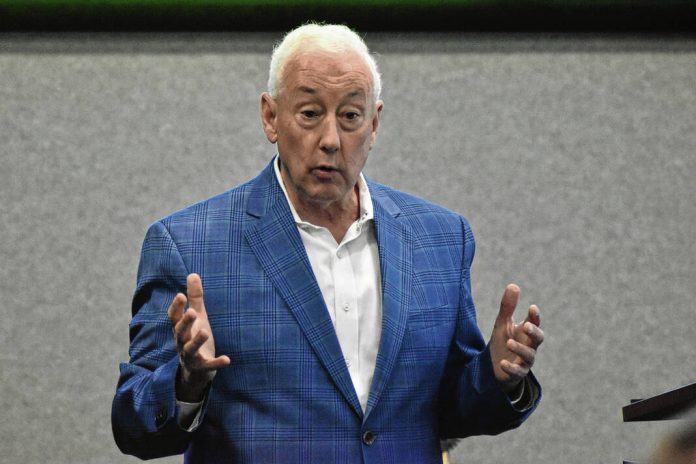Rep. Greg Pence, R-Ind., has voted in favor of a bill that would require voters to provide proof of citizenship to cast ballots in federal elections, a proposal Republicans have prioritized as an election-year talking point even as research shows noncitizens illegally registering and casting ballots in federal elections is exceptionally rare.
The legislation, approved largely along partisan lines but with five Democrats voting in favor, is unlikely to advance through the Democratic-led Senate, The Associated Press reported. The Biden administration also says it’s strongly opposed because there already are safeguards to enforce the law against noncitizens voting.
Still, the House vote will give Republicans an opportunity to bring attention to two of their central issues this year — border and election security.
It also provides an opportunity to fuel former President Donald Trump’s claims that Democrats have encouraged the surge of migrants so they can register them to vote, which would be illegal, according to wire reports. Noncitizens are not allowed to vote in federal elections, nor is it allowed for any statewide elections.
“One of our most fundamental rights as U.S. citizens is the right to vote in federal elections,” Pence said in a statement after the vote. “Letting illegal immigrants vote should not even be a question, and I joined my colleagues in voting yes to ensure that privilege stays with the American people alone.”
The fixation on noncitizen voting is part of a broader and long-term Trump campaign strategy of casting doubt on the validity of an election should he lose, and he has consistently pushed that narrative during his campaign rallies this year, according to wire reports. Last month in Las Vegas, he told supporters, “The only way they can beat us is to cheat.” It also is part of a wider Republican campaign strategy, with GOP lawmakers across the country passing state legislation and putting noncitizen voting measures on state ballots for November.
The majority of Democrats and voting rights advocates have said the legislation is unnecessary because it’s already a felony for noncitizens to register to vote in federal elections, punishable by fines, prison or deportation, according to the AP. Anyone registering must attest under penalty of perjury that they are a U.S. citizen. Noncitizens also are not allowed to cast ballots at the state level. A handful of municipalities allow them to vote in some local elections.
They also have pointed to surveys showing that millions of Americans don’t have easy access to up-to-date documentary proof of citizenship, such as a birth certificate, naturalization certificate or passport, and therefore the bill could inhibit U.S. citizen voters who aren’t able to further prove their status.
During the Wednesday floor debate, Rep. Joe Morelle of New York, the top Democrat on the House Administration Committee, expressed concern that the bill would disenfranchise various American citizens.
He mentioned military members stationed abroad who couldn’t show documentary proof of citizenship in person at an election office, as well as married women whose names have changed, Native Americans whose tribal IDs don’t show their place of birth and natural disaster survivors who have lost their personal documents.
Morelle said he doesn’t see the bill as an attempt to maintain voter rolls, but as part of larger GOP-led plans to question the validity of the upcoming election.
Yet Republicans who support the bill contend the unprecedented surge of migrants illegally crossing the U.S.-Mexico border creates too large a risk of noncitizens slipping through the cracks and casting ballots that sway races in November, according to wire reports.
“Every illegal vote cancels out the vote of a legal American citizen,” said Rep. Bryan Steil of Wisconsin, the Republican chair of the House Administration Committee.
If passed, the bill would require noncitizens to be removed from state voter rolls and require new applicants to provide documentary proof of U.S. citizenship. It also would require states to establish a process for applicants who can’t show proof to provide other evidence beyond their attestation of citizenship, though it’s unclear what that evidence could include.
Several secretaries of state, interviewed during their summer conference in Puerto Rico this week, said noncitizens attempting to register and vote is not a big problem in their state, according to the AP.
Utah Lt. Gov. Deidre Henderson, a Republican who oversees elections, said she supports the legislation in concept but provided a cautionary tale about how aggressively culling voter rolls can sometimes result in the removal of qualified voters.
A few years ago, everyone in her household received mail ballots for a municipal election, except her. She had been removed from the rolls because she had been born in the Netherlands, where her father was stationed with the U.S. Air Force.
“I was the lieutenant governor, I was overseeing elections, and I got taken off because I was born in the Netherlands,” she said, “So I think we definitely have those checks and balances in the state of Utah, maybe to an extreme.”
By Andy East — The (Columbus) Republic is a sister newspaper of the Daily Journal.





